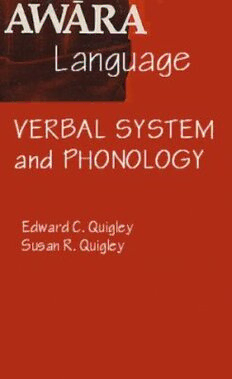
Awara Phonology and the Awara Verbal System PDF
Preview Awara Phonology and the Awara Verbal System
THE AWARA VERBAL SYSTEM by Susan R. Quigley Bachelor of Arts, The King's College, 1987 A Thesis Submitted to the Graduate Faculty of the University of North Dakota in partial fulfillment of the requirements for the degree of Master of Arts Grand Forks, North Dakota December 2002 Copyright 2002 Susan R. Quigley ii This thesis, submitted by Susan R. Quigley in partial fulfillment of the requirements for the Degree of Master of Arts from the University of North Dakota, has been read by the Faculty Advisory Committee under whom the work has been done and is hereby approved. (Chairperson) This thesis meets the standards for appearance, conforms to the style and format requirements of the Graduate School of the University of North Dakota, and is hereby approved. Dean of the Graduate School Date iii PERMISSION Title The Awara Verbal System Department Linguistics Degree Master of Arts In presenting this thesis in partial fulfillment of the requirements for a graduate degree from the University of North Dakota, I agree that the library of this University shall make it freely available for inspection. I further agree that permission for extensive copying for scholarly purposes may be granted by the professor who supervised my thesis work or, in his absence, by the chairperson of the department or the dean of the Graduate School. It is understood that any copying or publication or other use of this thesis or part thereof for financial gain shall not be allowed without my written permission. It is also understood that due recognition shall be given to me and to the University of North Dakota in any scholarly use which may be made of any material in my thesis. Signature _____________________________________ Date _____________________________________ iv TABLE OF CONTENTS List of Figures................................................................................................................ix List of Tables..................................................................................................................x List of Abbreviations and Special Symbols....................................................................xii Acknowledgements.....................................................................................................xiii Abstract.........................................................................................................................xv 1 Introduction.............................................................................................................1 2 Brief Description of Phonology................................................................................4 2.1 Phonemes and Orthography.........................................................................4 2.2 Morphophonemic Processes........................................................................5 2.3 Tables Showing Variation in Verbs.............................................................7 3 Overview of Syntax and Morphology.....................................................................11 3.1 Clauses .....................................................................................................11 3.2 Verbs........................................................................................................12 3.3 Serial-Verb Constructions.........................................................................14 3.4 Subordinate-Dependent Clauses................................................................15 3.5 Anaphoric Pro-verbs Based on ting 'be'.....................................................16 3.6 Classifiers.................................................................................................16 3.7 Classifier and Noun Phrases......................................................................17 3.8 Postpositions.............................................................................................20 4 Clause Types..........................................................................................................22 4.1 Active Clauses..........................................................................................22 4.2 Stative Clauses..........................................................................................23 4.2.1 Stative Clauses with Non–Verbal Predicates................................23 4.2.2 Stative Clauses with Non–Inflecting Existential Verbs.................24 v 4.2.3 Stative Clauses with Inflecting Verbs...........................................24 4.3 Independent Clauses..................................................................................25 4.4 Dependent Clauses....................................................................................27 4.4.1 Subordinate–Dependent Clauses..................................................27 4.4.2 Cosubordinate-Dependent Clauses...............................................28 5 Modal Nouns.........................................................................................................32 5.1 =nangäsä 'deontic'....................................................................................34 5.2 =nangän 'deontic'.....................................................................................36 5.3 =nage 'purpose'.........................................................................................37 5.4 Types of Meaning in Modal Nouns...........................................................39 6 Verb Subcategories................................................................................................41 6.1 Morphological Pattern...............................................................................41 6.2 Valence.....................................................................................................42 6.2.1 Intransitive Verbs.........................................................................43 6.2.2 Transitive Verbs...........................................................................44 6.2.3 Semitransitive Verbs....................................................................47 Semitransitive Verbs with No Object-Indexing Prefix..............49 Semitransitive Verbs with Optional Object-Indexing Prefix......49 Semitransitive Verbs with Obligatory Object-Indexing Prefix..51 6.2.4 Ditransitive Verbs........................................................................52 6.2.5 Benefactive Verbs........................................................................53 6.3 Inherent Aspect.........................................................................................54 7 Verbal Morphology................................................................................................56 7.1 Derivational Verb Stem Morphology.........................................................56 7.1.1 Lexical Compounding..................................................................56 7.1.2 Benefactive Compounds...............................................................58 7.1.3 Verbs formed with –ta 'become'...................................................61 7.2 Verbal Inflection.......................................................................................62 vi 7.2.1 Object-Indexing Prefixes..............................................................62 7.2.2 Verb Suffix Classes......................................................................66 7.2.3 Subject-Indexing Suffixes............................................................67 7.2.4 Final-Verb Subject–Indexing Suffixes..........................................69 Tense Suffixes..........................................................................69 Imperative Mood Suffixes........................................................73 Irrealis Suffixes........................................................................78 7.2.5 Medial-Verb Subject–Indexing Suffixes.......................................80 Same-Subject Suffixes..............................................................81 Different-Subject Suffixes........................................................82 7.2.6 Aspect Suffixes............................................................................83 –ga and –ka 'Dynamic Imperfective'........................................83 –xät 'Static Imperfective'..........................................................87 Distinction between the Dynamic and Static Imperfectives.......88 7.2.7 Temporal Suffixes........................................................................89 –gämäta 'Persistent'.................................................................90 –hi 'Durative'............................................................................91 –nage 'soon'..............................................................................93 8 Subordinate–Dependent Clauses............................................................................95 8.1 Complement Clauses.................................................................................95 8.2 Adverbial Clauses.....................................................................................98 8.2.1 Temporal Clauses.........................................................................99 8.2.2 Locative Clauses........................................................................100 8.2.3 Manner Clauses..........................................................................101 8.2.4 Reason and Purpose Clauses......................................................101 8.2.5 Conditional Clauses...................................................................102 9 Cosubordinate Clauses followed by Postpositions................................................103 10 Negation..............................................................................................................105 vii 10.1 Scope of Negation...................................................................................105 10.2 Negation with Modal Nouns....................................................................107 11 Serial-Verb Constructions....................................................................................109 11.1 Distinguishing Serial-Verb Constructions from Clause Chains................110 11.2 Serial-Verb Constructions and Compound Verbs....................................113 11.3 Serial Verbs Encoding Complex Events..................................................114 11.4 Serial Verbs Encoding Direction.............................................................116 11.5 Serial Verbs Encoding Specific Aspects..................................................117 11.6 Ambient Serial-Verb Constructions.........................................................119 11.7 Preceding Motion Verb Constructions.....................................................120 11.7.1 Motion Serial-Verb Constructions..............................................120 11.7.2 Motion Serial Verb-Phrase Constructions...................................121 11.7.3 äng-Motion Serial Verb-Phrase Constructions...........................123 11.7.4 Reduplication of Motion Verb....................................................123 Appendix: Allomorphs of Unvoiced Stop–Initial Suffixes and Clitics..........................124 References...................................................................................................................126 viii LIST OF FIGURES Figure 1 General Locality Map.......................................................................................1 Figure 2 Language Map..................................................................................................2 Figure 3 Subcategorization Frames for Agent–oriented Semitransitive Verbs...............47 Figure 4 Subcategorization Frames for Patient–oriented Semitransitive Verbs..............48 ix LIST OF TABLES Table 1 Vowel Phonemes...............................................................................................4 Table 2 Consonant Phonemes.........................................................................................4 Table 3 Template for Tables Showing Variation in Verbs...............................................7 Table 4 ˜–, t–, and p– Final Verbs..................................................................................8 Table 5 mut 'throw'.........................................................................................................8 Table 6 mi˜ 'give'...........................................................................................................9 Table 7 p-Final Motion Verbs.........................................................................................9 Table 8 Verbs with Monosyllabic and Disyllabic Stems...............................................10 Table 9 ku˜Å˜ 'die'.......................................................................................................10 Table 10 Classifiers......................................................................................................17 Table 11 Classifiers with Abstract Nouns.....................................................................17 Table 12 Number Object Prefixes.................................................................................62 Table 13 Person/Number Object Prefixes.....................................................................63 Table 14 dup 'see'.........................................................................................................64 Table 15 sipmäng 'hit'..................................................................................................65 Table 16 hang 'bite/cook'.............................................................................................65 Table 17 Verb Suffixes..................................................................................................66 Table 18 Subject–Indexing Suffixes Occurring on Verbs..............................................68 Table 19 Tense, Modality and Different-Subject Suffixes followed by Subject-Indexing Suffixes.............................................69 Table 20 Present Tense.................................................................................................70 Table 21 Past Tense......................................................................................................71 Table 22 Future Tense..................................................................................................72 Table 23 Default Imperative Mood................................................................................73 Table 24 Immediate Imperative Mood..........................................................................75 x
